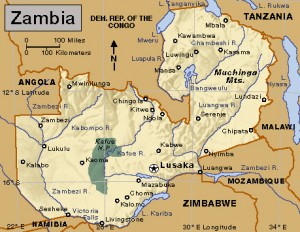Language Monday: Bemba
January 29, 2018
In Bemba, the language of a large ethnic group living in northeastern Zambia of south-central Africa, lelo nipali Cimo means today is Monday. After Zambia’s official language, English, Bemba is the nation’s most common tongue. More than 4 million people speak Bemba or related dialects as their first language. It is also a common lingua franca in the region. A lingua franca is a language that allows people who do not share a common native language to communicate. Millions of other people in south-central Africa speak Bemba as a second or third language.

Click to view larger image
Ulubemba, the traditional homeland of the Bemba people, includes parts of northeastern Zambia. Credit: WORLD BOOK map
According to Bemba folklore, their people once lived in a kingdom called Kola that was part of the ancient Luba Empire in what is now the Democratic Republic of the Congo. There, the Bemba lived under the rule of a great chief called Mukulumpe Mubemba. The name Bemba is derived from that chief’s name. After a series of bitter quarrels within the royal family, the chief’s sons fled with a group of followers. After much traveling and many battles, the sons and their followers settled in what is now northeastern Zambia. They set up a society with a paramount chief, called Chitimukulu (The Great Tree) in the Bemba language. Today, the position of Chitimukulu still exists and has a strong advisory role within the national government of Zambia.
Throughout history, Bemba people have lived mostly as farmers. However, they were viewed as a fierce, warlike people by early European travelers and explorers. The British colonized what is now Zambia in the 1890’s. They called the region Northern Rhodesia. In the 1920’s, the discovery of large copper ore deposits in south-central Africa brought a rush of Bemba speakers from the countryside to towns for jobs in the copper mines of Zambia and nearby nations.
By the 1940’s, an urban dialect (variety of language) known as “Town Bemba” became the main language in the “copperbelt” of south-central Africa. Town Bemba illustrates the dynamic character of many African languages as they evolved in response to colonization and urbanization. Town Bemba incorporates many terms from British English. Many American English terms have also entered the Bemba lexicon (collection of words) through international business relationships, television, and popular music.


